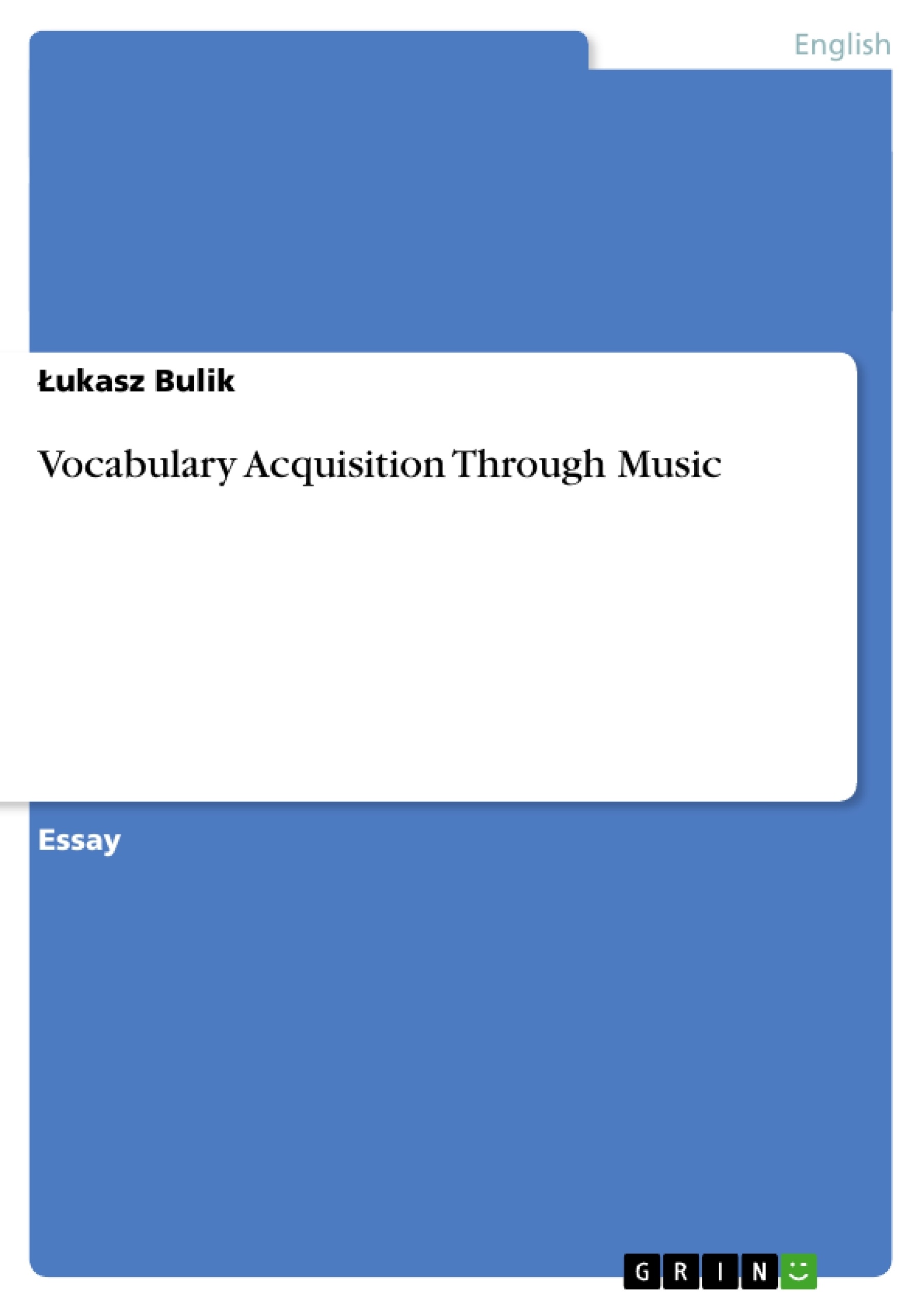The practical part of my diploma thesis will be dealing with the research I carried out in the time span of 3 months, with 53 subjects (students), in four different groups. The research consisted of five different parts by means of which I wanted to find out the answer to the question if music can help the learners with vocabulary acquisition, and to what extent.
The first two sections describe in detail the parts of my research and the researched groups. The third section provides the results of the first questionnaire, the fourth section covers the song-lesson experiment describing the sequence of activities, the course of the lesson in the groups, evaluation and its results. At the end of this chapter a comparison of the results will be provided.
PARTS OF THE RESEARCH
My research consisted of a questionnaire- based on a song, and two collections of results.
The very first part of the research represented the first questionnaire by means of which I needed to find out what attitude to music the students had, and mainly what kind of music they liked, what kind of music they did not like, which song was their favourite, and if they liked singing. These items of information were the most significant, and the “song-research” was based on them
Inhaltsverzeichnis (Table of Contents)
- RESEARCH
- PARTS OF THE RESEARCH
- DESCRIPTION OF RESEARCHED GROUPS
- Secondary school group (SSG)
- Grammar school group (GSG)
- Language school group A (LSGA)
- Language school group B (LSGB)
- PLANNING THE RESEARCH LESSON
- RESULTS OF THE FIRST QUESTIONNAIRE
Zielsetzung und Themenschwerpunkte (Objectives and Key Themes)
This research explores the potential of music to assist with vocabulary acquisition in English language learners. The primary objective is to determine if music can enhance vocabulary learning and, if so, to what extent. The study focuses on a group of 53 subjects across four different age and educational backgrounds, with the research conducted over a three-month period.
- The impact of music on vocabulary acquisition in different learner groups
- The role of song-based activities in vocabulary learning
- The effectiveness of diverse teaching strategies incorporating music
- The influence of learner preferences and musical tastes on vocabulary learning
- The comparison of traditional learning methods with those incorporating music
Zusammenfassung der Kapitel (Chapter Summaries)
The first section outlines the research methodology, which involves a combination of questionnaires, song-based activities, and subsequent evaluations. The research aims to determine if music can facilitate vocabulary acquisition and analyze the effectiveness of different music-based learning strategies.
The second section provides detailed descriptions of the four research groups, highlighting their characteristics such as age, gender, English proficiency, and educational backgrounds. These factors are considered potentially influential on the research outcomes.
The third section presents the results of the initial questionnaire, exploring the participants' attitudes towards music and their preferred music genres. These findings establish a foundation for the subsequent song-based lesson experiment.
The fourth section focuses on the song-based lesson experiment, detailing the sequence of activities implemented in each group. It analyzes the progress and outcomes of the experiment, including vocabulary acquisition, engagement levels, and overall effectiveness.
Schlüsselwörter (Keywords)
The main keywords and focus topics of this research include music-assisted vocabulary acquisition, song-based learning, English language learning, learner preferences, diverse teaching strategies, and empirical research findings.
Frequently Asked Questions
Does music really help with English vocabulary acquisition?
According to the research, music can assist learners in acquiring vocabulary. The study explored to what extent song-based activities enhance the learning process compared to traditional methods.
How long was the research study conducted?
The empirical research was carried out over a time span of three months to observe the progress of the students involved.
Who participated in the vocabulary acquisition study?
The study involved 53 subjects divided into four distinct groups: a secondary school group, a grammar school group, and two different language school groups.
What was the purpose of the initial questionnaire?
The first questionnaire aimed to determine the students' attitudes toward music, their genre preferences, and their favorite songs, which served as a foundation for the "song-research" lesson.
What activities were included in the song-based lesson experiment?
The experiment included a specific sequence of activities designed around a song to facilitate vocabulary learning, followed by evaluation and a comparison of results across the different groups.
What factors influenced the research outcomes?
Factors such as age, gender, English proficiency, and personal musical tastes were considered potentially influential on the effectiveness of music-assisted learning.
- Quote paper
- Łukasz Bulik (Author), 2012, Vocabulary Acquisition Through Music, Munich, GRIN Verlag, https://www.grin.com/document/273904



